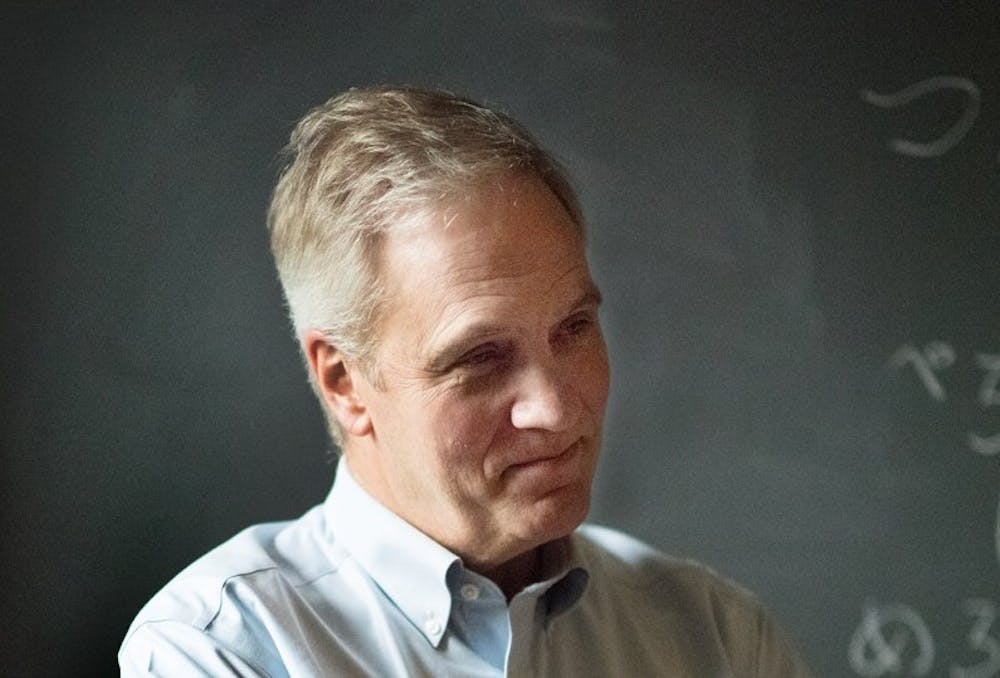As concerns about the impending climate crisis take the spotlight in political debates, similar controversy surges much closer to home. Divest Princeton is a growing group of students and alumni calling for the total removal of University funds from fossil fuel companies. So far, 735 alums, current students, and faculty members have signed an open letter to President Eisgruber ’83, but the movement has also been met with disapproval from certain administrators and professors. Robert Nixon, the Currie C. and Thomas A. Barron Family Professor in the Humanities and the Environment, and Stephen Pacala, the Frederick D. Petrie Professor in Ecology and Evolutionary Biology and director of the University’s Carbon Mitigation Initiative, are colleagues, friends, and on opposing sides of this emerging debate on campus. The Daily Princetonian spoke to the two professors to hear why one supports the movement, and the other, a climate scientist himself, disagrees.
Stephen Pacala, the Frederick D. Petrie Professor in Ecology and Evolutionary Biology, has always had what he calls a “life plan”: work to become the best possible scientist for the first stage of his life before transitioning to deliver on the “social contract.” Degrees from Dartmouth and Stanford, 10 years as a professor at the University of Connecticut, and a move to Princeton saw that first stage become reality. When British Petroleum (BP) showed up on campus 21 years ago, he says, he entered the period of payback.
The Carbon Mitigation Initiative, now entering its 20th year, is a partnership between the University and BP with goals to reduce the carbon dioxide surplus in the atmosphere. Pacala, who calls increasing carbon emissions the “mother of all climate problems,” established the initiative and continues to direct it today.
The sponsorship may seem strange, given that the ultimate objective of the group is to essentially put BP out of business. But Pacala emphasized that the source of funding holds no sway over the content of the research.
“They were forthright that they thought that the climate problem was likely to be existential for the [fossil fuel] industry, and they wanted to understand it better,” he said. “They don’t have input about what we study. They just give us the money, and then we do whatever we want.”
In response to Divest Princeton, Pacala pointed out the discrepancy between divestment and boycotting. The University simply cannot function without fossil fuels; an attempt to stop their use would result in catastrophe. Therefore, he argues, divestment isn’t morally sound.
“Both investing in and buying fossil fuel products puts money in the hands of the people I don’t like,” Pacala said. “So ethically, I cannot find a consistent reason why I would divest and not boycott, or boycott and not divest.”
Those who support divestment argue that it is not necessarily about weakening the industry — the University alone cannot effect such a change. The larger concern is about depriving fossil fuel companies of their social license and refusing, as a well-respected academic institution, to legitimize their actions. To Pacala’s mind, the ethical significance of removing financial backing is diluted by the fact that the campus and its individuals will continue to rely on fossil fuels.

“If we eliminated the use of fossil fuels right now, a large fraction of humanity would starve to death,” Pacala said. “Saying that it’s bad, considering that if you just stopped using it right away, we would all die — you just can’t maintain that.”
That said, he noted a distinction in scale between industry and company divestment. Individuals and institutions can plausibly both boycott and divest from specific companies they deem unethical, but dissociation from the entire industry is inconsistent with continued practical use.
This may not always be the case, according to Pacala. He contended that the solution to the carbon problem may come more quickly than we think.
“Really recently, there’s been massive technological hope that’s emerged,” Pacala said. “We are one innovation away from a system that would be cheaper than fossil.”

He also called for government subsidies to help wind and solar power reach the scale of overtaking fossil fuel. They have succeeded in the past in creating a market to drive the cost down for solar power, and he is convinced that they could work again.
Pacala maintained that social activism plays a crucial role in informing and enlivening the general public about climate change, but symbolism must align with action. Instead of channeling energy into asking the University to divest, concerned individuals should be focused on making the fossil industry completely obsolete.








